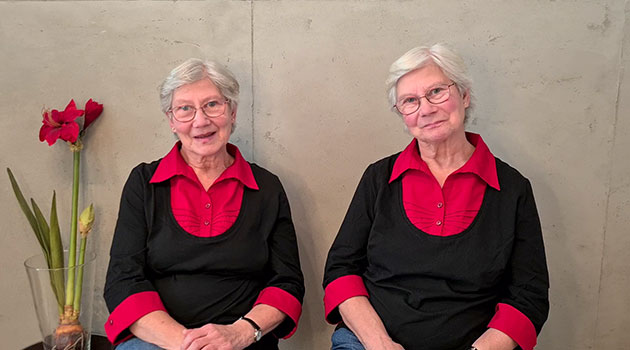Irmgard and Ursula, you have been singing soprano together for 51 years, first in the Berliner Volkschor, now in the BOC.
What makes singing in a choir so special for you?
Ursula: Singing frees the soul. Sometimes you go to the choir and don’t feel like singing because the day has already demanded a lot from you. And after the rehearsal, you think to yourself how wonderful it was. In the choir you get to talk to lots of people, you are connected with the whole vocal group. Everyone is valued in their own way. It’s important to both of us to stay connected with singing for as long as possible.
Irmgard: Singing gives you a good feeling, the music gives you strength in many situations, even in difficult ones, and you can calm down inside. The social aspect plays an important role, because the choir can be a real family. Nobody feels more important, nobody stands out, not even vocally. We always accept new members straight away, without any ulterior motives. And the more people join us, the bigger the choir family becomes.
With works like the Missa solemnis, amateurs sing challenging music in the BOC. Did you already have singing experience when you started singing in the choir?
Irmgard: Music has been with us since childhood. We listened to the radio a lot as teenagers, were in the school choir and liked a wide variety of musical styles, pop songs, sea shanties, opera, operetta, but hardly any classical music in the form of oratorios. We were gently introduced to classical music by Mr Sell, so to speak. As amateurs, we sing pieces in the choir that we might otherwise never have dared to tackle, or that people thought only professionals could do. Almost every big piece is new territory in which we have to find our feet. A horizon has been created for these works.
Ursula: As an amateur singer, you gain the pleasure of encountering new works. You don’t need to be afraid, you get goose bumps when you actually want to perform such great works on stage. Standing up straight, delivering the notes cleanly. Emotions are involved when you try to mentally absorb everything about a new piece. The group feels its way together, everyone is carried along by the others, that’s something special. In this way, a layman not only experiences Hänschen Klein, but also works through Beethoven’s Ninth, the Carmina Burana and Dvorak’s Mass in D major.
What do you particularly like to remember about 50 years of the BOC and the Berliner Volkschor?
Irmgard: Our New Year’s Eve concert at the Brandenburg Gate in 1998 was fantastic. Beethoven’s Ninth, with choirs from all over the world, as far away as Australia. The concert was broadcast on TV and it crackled when we started singing just before twelve o’clock. A real highlight that was seen everywhere.
Ursula: The Ninth has also become a bit of a favourite work. Singing along at the Brandenburg Gate in 1998 was pure excitement. Just don’t start too early, look closely. It was very cold, so you had to concentrate very hard to get the right notes. But it was like always, as soon as the first note was out, it was great. The “Sternstunden” in 1987 around the Victory Column with several choirs was also an experience. We sang and danced to the lyrics, it was indescribable.
… and if one of you sings wrong, what does the other one do?
Ursula: It happens, and of course you notice it. During the performance, you immediately react with restraint. We sisters talk about it after the concert. But we’re certainly not the only ones to whom this happens. Mistakes during rehearsals are okay, but we are amateurs with a knowledge of music that we have acquired over our long membership. We are not sight readers.





